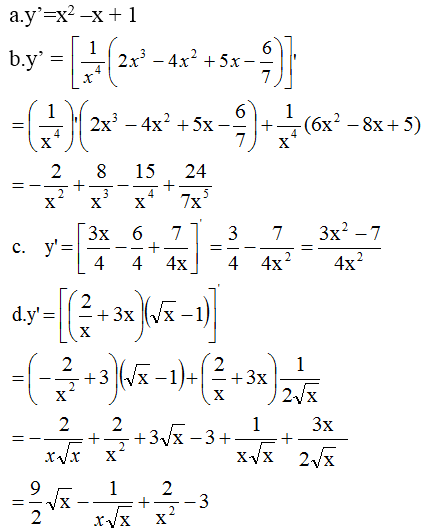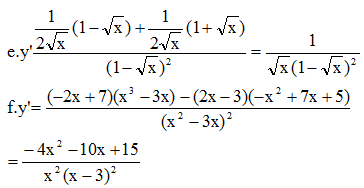Hãy nhập câu hỏi của bạn vào đây, nếu là tài khoản VIP, bạn sẽ được ưu tiên trả lời.

Theo giả thiết ta có : \(\begin{cases}\left(5x-y\right)+\left(x+2y\right)=2\left(2x+3y\right)\\\left(y+1\right)^2\left(x-1\right)^2=\left(xy+1\right)^2\end{cases}\)
\(\Leftrightarrow\begin{cases}2x=5y\\x+y=2\end{cases}\) hoặc \(\Leftrightarrow\begin{cases}2x=5y\\xy+x+y=0\end{cases}\)
\(\Leftrightarrow\begin{cases}2x=5y\\x+y=2\end{cases}\) hoặc \(\Leftrightarrow\begin{cases}2x=5y\\y\left(5y\right)+5y+2y=0\end{cases}\)
\(\Leftrightarrow\begin{cases}x=\frac{10}{3}\\y=\frac{4}{3}\end{cases}\) hoặc \(\begin{cases}x=0,y=0\\x=-\frac{3}{4},y=-\frac{3}{10}\end{cases}\)

Để 3 số hạng đó lập thành cấp số cộng, ta có :
\(\left(5^{1+x}+5^{1-x}\right)+\left(25^x+25^{-x}\right)=2\left(\frac{a}{2}\right)\)
\(\Leftrightarrow a=5\left(5^x+\frac{1}{5^x}\right)+\left(5^{2x}+\frac{1}{5^{2x}}\right)\)
Theo bất đẳng thức côsi, ta có : \(5^x+\frac{1}{5^x}\ge2\sqrt{1}=2,5^{2x}+\frac{1}{5^{2x}}\ge2\)
\(\Rightarrow a\ge5.2+2=12\)
Vậy với : \(a\ge12\), thì 3 số đó lập thành cấp số cộng.

Theo giả thiết : \(\begin{cases}xy=3^2\\x^4=y\sqrt{3}\end{cases}\) \(\Leftrightarrow\begin{cases}y=\frac{9}{x}\\x^4=\frac{9\sqrt{3}}{x}\end{cases}\) \(\Leftrightarrow\begin{cases}y=\frac{9}{x}\\x^5=9\sqrt{3}\end{cases}\)
\(\Leftrightarrow\begin{cases}x=\sqrt[5]{\sqrt{3^5}}\\y=\frac{3^2}{x}\end{cases}\)
\(\Leftrightarrow\begin{cases}x=\sqrt{3}\\y=3\sqrt{3}\end{cases}\)

Bài làm
a)dãy số U: \(2,7,12,...x\)
U là cấp số cộng\(\Rightarrow\left\{{}\begin{matrix}d=u_2-u_1=7-2=5\\u_1=2\end{matrix}\right.\)
\(U_n=U_1+\left(n-1\right)d\)
=> \(n=\dfrac{U_n-U_1}{d}+1=\dfrac{x-2}{5}+1=\dfrac{\left(x+3\right)}{5}\)
\(S_n=\dfrac{n\left(U_1+U_n\right)}{2}=\dfrac{\dfrac{\left(x+3\right)}{5}\left(2+x\right)}{2}=\dfrac{\left(x+3\right)\left(x+2\right)}{2.5}=245\)
\(x^2+5x+6=2450\)
\(x^2+5x-2444=0\)
\(\Delta=5^2-4.\left(-2444\right)=9801=\)99^2
\(\left\{{}\begin{matrix}x_1=\dfrac{-5-99}{2}< 0\left(loai\right)\\x_2=\dfrac{-5+99}{2}=47\end{matrix}\right.\)
Đáp số: x=47
b) Xét cấp số cộng 1, 6, 11, ..., 96. Ta có :
\(96=1+\left(n-1\right)5\Rightarrow n=20\)
Suy ra :
\(S_{20}=1+6+11+...+96=\dfrac{20\left(1+96\right)}{2}=970\)
và \(2x.20+970=1010\)
Từ đó : \(x=1\)

16.
\(y'=\frac{\left(cos2x\right)'}{2\sqrt{cos2x}}=\frac{-2sin2x}{2\sqrt{cos2x}}=-\frac{sin2x}{\sqrt{cos2x}}\)
17.
\(y'=4x^3-\frac{1}{x^2}-\frac{1}{2\sqrt{x}}\)
18.
\(y'=3x^2-2x\)
\(y'\left(-2\right)=16;y\left(-2\right)=-12\)
Pttt: \(y=16\left(x+2\right)-12\Leftrightarrow y=16x+20\)
19.
\(y'=-\frac{1}{x^2}=-x^{-2}\)
\(y''=2x^{-3}=\frac{2}{x^3}\)
20.
\(\left(cotx\right)'=-\frac{1}{sin^2x}\)
21.
\(y'=1+\frac{4}{x^2}=\frac{x^2+4}{x^2}\)
22.
\(lim\left(3^n\right)=+\infty\)
11.
\(\lim\limits_{x\rightarrow1^+}\frac{-2x+1}{x-1}=\frac{-1}{0}=-\infty\)
12.
\(y=cotx\Rightarrow y'=-\frac{1}{sin^2x}\)
13.
\(y'=2020\left(x^3-2x^2\right)^{2019}.\left(x^3-2x^2\right)'=2020\left(x^3-2x^2\right)^{2019}\left(3x^2-4x\right)\)
14.
\(y'=\frac{\left(4x^2+3x+1\right)'}{2\sqrt{4x^2+3x+1}}=\frac{8x+3}{2\sqrt{4x^2+3x+1}}\)
15.
\(y'=4\left(x-5\right)^3\)

a) Cách 1: y' = (9 -2x)'(2x3- 9x2 +1) +(9 -2x)(2x3- 9x2 +1)' = -2(2x3- 9x2 +1) +(9 -2x)(6x2 -18x) = -16x3 +108x2 -162x -2.
Cách 2: y = -4x4 +36x3 -81x2 -2x +9, do đó
y' = -16x3 +108x2 -162x -2.
b) y' = .(7x -3) +
(7x -3)'=
(7x -3) +7
.
c) y' = (x -2)'√(x2 +1) + (x -2)(√x2 +1)' = √(x2 +1) + (x -2) = √(x2 +1) + (x -2)
= √(x2 +1) +
=
.
d) y' = 2tanx.(tanx)' - (x2)' =
.
e) y' = sin
=
sin
.


Ta có: 1 , x 2 , 6 − x 2 lập thành cấp số nhân khi và chỉ khi:
x 2 2 = 1. ( 6 − x 2 ) ⇔ x 4 = 6 − x 2 ⇔ x 4 + x − 2 6 = 0 ⇔ x 2 = 2 ⇔ x = ± 2
Chọn đáp án B.